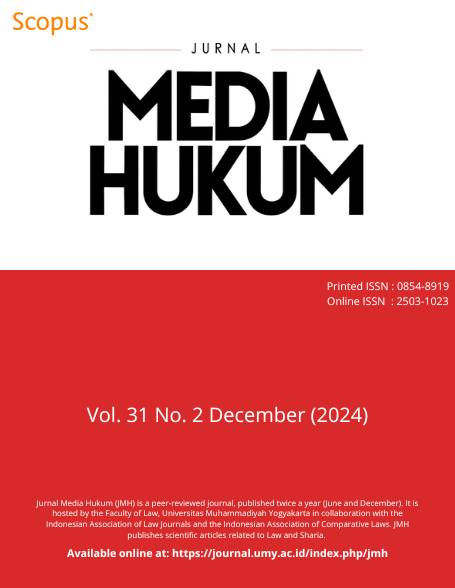The Risks of Using Artificial Intelligence on Privacy and Human Rights: Unifying Global Standards
DOI:
https://doi.org/10.18196/jmh.v31i2.23480Keywords:
Artificial Intelligence, Digital Technology, Global Standards, Human Rights, PrivacyAbstract
Artificial intelligence (AI) presents significant opportunities and challenges, particularly balancing innovation with protecting privacy and human rights. The increasing integration of AI into daily life has amplified risks to digital privacy, access to information, and online communication, raising concerns about human rights violations. Governments must address these risks by implementing practical measures to ensure safe AI usage and redressing harm caused by unethical practices. This article explores the impact of AI on privacy and human rights, utilizing the 2024 Council of Europe Framework Convention on AI, Human Rights, Democracy, and the Rule of Law as a basis for ethical considerations. Employing an analytical methodology, the study examines international charters and national legislation to highlight disparities in addressing AI-related privacy concerns and to identify gaps between global human rights standards and digital technologies. Comparative analysis is conducted to evaluate international and national approaches to AI governance. The findings emphasize the urgent need for unified global standards to protect digital human rights, harmonize AI ethics, and reduce risks associated with AI applications. Recommendations include adopting comprehensive legal frameworks and promoting international cooperation to ensure ethical AI deployment aligned with human rights principles.References
Abd Ghadas, Zuhairah Ariff, and Hartinie Abd Aziz, ‘Analysis on The Doctrine of Limited Liability under Company Law and Shariah’, Al-Shajarah Journal of Islamic Thought and Civilization of IIUM, 24.293–310 (2019). https://doi.org/10.31436/shajarah.v24i2.947.
Abe, Oyeniyi, and Akinyi J Eurallyah, ‘Regulating Artificial Intelligence through a Human Rights-Based Approach in Africa’, African Journal of Legal Studies, 14.4 (2021), 425–48. https://doi.org/10.1163/17087384-12340084.
Ahmad, Sayed Fayaz, Heesup Han, Muhammad Mansoor Alam, Mohd. Khairul Rehmat, Muhammad Irshad, Marcelo Arraño-Muñoz, and others, ‘Impact of Artificial Intelligence on Human Loss in Decision Making, Laziness and Safety in Education’, Humanities and Social Sciences Communications, 10.1 (2023), 311. https://doi.org/10.1057/s41599-023-01787-8.
Al-Billeh, Tareq, ‘Disciplinary Measures Consequent on the Judges’ Misuse of Social Media in Jordanian and French Legislation: A Difficult Balance between Freedom of Expression and Restrictions on Judicial Ethics’, Kutafin Law Review, 10.3 (2023), 681–719. https://doi.org/10.17803/2713-0533.2023.2.25.681-719.
Al-Billeh, Tareq, ‘Teaching Law Subjects by Using Educational Robots: Does the Use of Robots Lead to the Development of Legal Skills Among Law Students?’, Asian Journal of Legal Education, 11.2 (2024), 188–200. https://doi.org/10.1177/23220058241227610.
Arumbinang, Mohammad Hazyar, Yordan Gunawan, and Andi Agus Salim, ‘Prohibition of Child Recruitment as Soldiers: An International Regulatory Discourse’, Jurnal Media Hukum, 30.1 (2023), 21–32. https://doi.org/10.18196/jmh.v30i1.19322.
Aulawi, Muhamad Haris, Yordan Gunawan, M. Hanaan Alfarizi, and Manuel Campos Lago, ‘Governing Indonesia’s Plan to Halt Bauxite Ore Exports: Is Indonesia Ready to Fight Lawsuit at the WTO?’, Bestuur, 11.1 (2023), 26–42. https://doi.org/10.20961/bestuur.v11i1.69178.
Bakiner, Onur, ‘The Promises and Challenges of Addressing Artificial Intelligence with Human Rights’, Big Data & Society, 10.2 (2023), 20539517231205476. https://doi.org/10.1177/20539517231205476.
Banh, Leonardo, and Gero Strobel, ‘Generative Artificial Intelligence’, Electronic Markets, 33.1 (2023), 63. https://doi.org/10.1007/s12525-023-00680-1.
Banks, Isabella, and Leonore Ten Hulsen, ‘Human Rights Weekend: Artificial Intelligence, Big Data & Human Rights: Progress or Setback?’, Amsterdam Law Forum, 11.3 (2019), 70. https://doi.org/10.37974/alf.340.
Bello y Villarino, José-Miguel, and Ramona Vijeyarasa, ‘International Human Rights, Artificial Intelligence, and the Challenge for the Pondering State: Time to Regulate?’, Nordic Journal of Human Rights, 40.1 (2022), 194–215. https://doi.org/10.1080/18918131.2022.2069919.
Bindra, Simrata, and Richa Jain, ‘Artificial Intelligence in Medical Science: A Review’, Irish Journal of Medical Science (1971 -), 193.3 (2024), 1419–29. https://doi.org/10.1007/s11845-023-03570-9.
Broeders, Dennis, ‘Aligning the International Protection of “the Public Core of the Internet” with State Sovereignty and National Security’, Journal of Cyber Policy, 2.3 (2017), 366–76. https://doi.org/10.1080/23738871.2017.1403640.
Chatterjee, Sheshadri, and Sreenivasulu N.S, ‘AI and Human Rights: A Comprehensive Study from Indian Legal and Policy Perspective’, International Journal of Law and Management, 64.1 (2022), 110–34. https://doi.org/10.1108/IJLMA-02-2021-0049.
Dawes, James, ‘Speculative Human Rights: Artificial Intelligence and the Future of the Human’, Human Rights Quarterly, 42.3 (2020), 573–93. https://doi.org/10.1353/hrq.2020.0033.
Donahoe, Eileen, and Megan MacDuffee Metzger, ‘AI and Human Rights’, Journal of Democracy, 30.2 (2019), 115–126. https://doi.org/10.1353/jod.2019.0029.
Fjelland, Ragnar, ‘Why General Artificial Intelligence Will Not Be Realized’, Humanities and Social Sciences Communications, 7.1 (2020), 10. https://doi.org/10.1057/s41599-020-0494-4.
Fortes, Pedro Rubim Borges, Pablo Marcello Baquero, and David Restrepo Amariles, ‘Artificial Intelligence Risks and Algorithmic Regulation’, European Journal of Risk Regulation, 13.3 (2022), 357–72. https://doi.org/DOI: 10.1017/err.2022.14.
Galaz, Victor, Miguel A Centeno, Peter W Callahan, Amar Causevic, Thayer Patterson, Irina Brass, and others, ‘Artificial Intelligence, Systemic Risks, and Sustainability’, Technology in Society, 67.1 (2021), 101741. https://doi.org/10.1016/j.techsoc.2021.101741.
Gocen, Ahmet, and Fatih Aydemir, ‘Artificial Intelligence in Education and Schools’, Research on Education and Media, 12.1 (2020), 13–21. https://doi.org/10.2478/rem-2020-0003.
Greenstein, Stanley, ‘Preserving the Rule of Law in the Era of Artificial Intelligence (AI)’, Artificial Intelligence and Law, 30.3 (2022), 291–323. https://doi.org/10.1007/s10506-021-09294-4.
Gunawan, Yordan, Yasir Perdana Ritonga, Mita Amelia, Siti Septiana K. Harun, and Nisa Nurhofipah Ramadani, ‘Does the Protection of Minority Groups in Xinjiang Fail?’, Sriwijaya Law Review, 4.2 (2020), 205–20. https://doi.org/10.28946/slrev.Vol4.Iss2.432.pp205-220.
Hamsin, Muhammad Khaeruddin, Rizaldy Anggriawan, and Farisma Jiatrahman, ‘Unveiling Ethical Implications: AI Robot Accountability in Islamic Context’, Jurnal Media Hukum, 30.2 (2023), 117–35. https://doi.org/10.18196/jmh.v30i2.18524.
Higham, Patricia, ‘Communicating with Technology, Computers and Artificial Intelligence: Are Human Rights and Privacy Being Neglected?’, Journal of Data Protection & Privacy, 3.4 (2020), 363–75. https://doi.org/10.69554/DNYT8227.
Hinks, Tim, ‘Artificial Intelligence Perceptions and Life Satisfaction’, Journal of Happiness Studies, 25.1 (2024), 5. https://doi.org/10.1007/s10902-024-00727-w.
Holl, Cody, ‘The Content Intelligence: An Argument against the Lethality of Artificial Intelligence’, Discover Artificial Intelligence, 4.1 (2024), 13. https://doi.org/10.1007/s44163-024-00112-9.
Huda, Muhammad Chairul, and Budi Ispriyarso, ‘Contribution of Islamic Law in the Discretionary Scheme That Has Implications for Corruption’, Ijtihad: Jurnal Wacana Hukum Islam Dan Kemanusiaan, 19.2 (2019), 147–67. https://doi.org/10.18326/ijtihad.v19i2.147-167.
Karnouskos, Stamatis, ‘Symbiosis with Artificial Intelligence via the Prism of Law, Robots, and Society’, Artificial Intelligence and Law, 30.1 (2022), 93–115. https://doi.org/10.1007/s10506-021-09289-1.
Koehler, Jana, ‘Business Process Innovation with Artificial Intelligence: Levering Benefits and Controlling Operational Risks’, European Business & Management, 4.2 (2018), 55. https://doi.org/10.11648/j.ebm.20180402.12.
KRIEBITZ, Alexander, and Christoph LÜTGE, ‘Artificial Intelligence and Human Rights: A Business Ethical Assessment’, Business and Human Rights Journal, 5.1 (2020), 84–104. https://doi.org/DOI: 10.1017/bhj.2019.28.
Kutyauripo, Innocent, Munyaradzi Rushambwa, and Lyndah Chiwazi, ‘Artificial Intelligence Applications in the Agrifood Sectors’, Journal of Agriculture and Food Research, 11.1 (2023), 100502 <https://doi.org/https://doi.org/10.1016/j.jafr.2023.100502>
Lubis, Muhammad Ikhsan, ‘The Relationship of International Human Rights Law with International Humanitarian Law in Situations of International Armed Conflicts’, Journal of Indonesian Legal Studies, 1.1 (2016), 13–34. https://doi.org/10.15294/jils.v1i01.16565.
Lukyanova, Ekaterina D., ‘Artificial Intelligence: Achievements and Postponed Risks’, Sociologicheskaja Nauka I Social Naja Praktika, 7.1 (2019), 142–48. https://doi.org/10.19181/snsp.2019.7.1.6275.
Metthania, Arzetta Zahra, and Siti Nurul Intan Sari Dalimunthe, ‘Legal Protection for Parties in Sale and Purchase Transactions of Virtual Objects’, Volksgeist: Jurnal Ilmu Hukum Dan Konstitusi, 5.2 SE-Articles (2022), 267–77. https://doi.org/10.24090/volksgeist.v5i2.7066.
Munoko, Ivy, Helen L Brown-Liburd, and Miklos Vasarhelyi, ‘The Ethical Implications of Using Artificial Intelligence in Auditing’, Journal of Business Ethics, 167.2 (2020), 209–34. https://doi.org/10.1007/s10551-019-04407-1.
Paraman, Pradeep, and Sanmugam Anamalah, ‘Ethical Artificial Intelligence Framework for a Good AI Society: Principles, Opportunities and Perils’, AI & SOCIETY, 38.2 (2023), 595–611. https://doi.org/10.1007/s00146-022-01458-3.
Parnas, David Lorge, ‘The Real Risks of AI’, Communications of the ACM, 60.10 (2017), 27–31. https://doi.org/10.1145/3132724.
Ramesh, Sumathy, ‘A Checklist to Protect Human Rights in Artificial-Intelligence Research’, Nature, 552.7685 (2017), 334–356. https://doi.org/10.1038/d41586-017-08875-1.
Risse, Mathias, ‘Human Rights and Artificial Intelligence: An Urgently Needed Agenda’, Human Rights Quarterly, 41.1 (2019), 1–16. https://doi.org/10.1353/hrq.2019.0000.
Sánchez Acevedo, Marco Emilio, ‘La Inteligencia Artificial En El Sector Público y Su Límite Respecto de Los Derechos Fundamentals’, Estudios Constitucionales, 20.1 (2022), 257–84. https://doi.org/10.4067/S0718-52002022000200257.
Saura, Jose Ramon, Domingo Ribeiro-Soriano, and Daniel Palacios-Marqués, ‘Assessing Behavioral Data Science Privacy Issues in Government Artificial Intelligence Deployment’, Government Information Quarterly, 39.4 (2022), 101679. https://doi.org/10.1016/j.giq.2022.101679.
Scherer, Matthew U., ‘Regulating Artificial Intelligence Systems: Risks, Challenges, Competencies, and Strategies’, Harvard Journal of Law & Technology, 29.2 (2016), 1–23. https://doi.org/10.2139/ssrn.2609777.
Semenov, A L, ‘Artificial Intelligence in Society’, Doklady Mathematics, 108.2 (2023), S168–78. https://doi.org/10.1134/S106456242355001X.
Stahl, Bernd Carsten, Laurence Brooks, Tally Hatzakis, Nicole Santiago, and David Wright, ‘Exploring Ethics and Human Rights in Artificial Intelligence – A Delphi Study’, Technological Forecasting and Social Change, 191.1 (2023), 122502. https://doi.org/10.1016/j.techfore.2023.122502.
de Swarte, Thibault, Omar Boufous, and Paul Escalle, ‘Artificial Intelligence, Ethics, and Human Values: The Cases of Military Drones and Companion Robots’, Artificial Life and Robotics, 24.3 (2019), 291–96. https://doi.org/10.1007/s10015-019-00525-1.
Thiebes, Scott, Sebastian Lins, and Ali Sunyaev, ‘Trustworthy Artificial Intelligence’, Electronic Markets, 31.2 (2021), 447–64. https://doi.org/10.1007/s12525-020-00441-4.
Timmers, Paul, ‘Ethics of AI and Cybersecurity When Sovereignty Is at Stake’, Minds and Machines, 29.4 (2019), 635–45. https://doi.org/10.1007/s11023-019-09508-4.
Turchin, Alexey, and David Denkenberger, ‘Classification of Global Catastrophic Risks Connected with Artificial Intelligence’, AI & SOCIETY, 35.1 (2020), 147–63. https://doi.org/10.1007/s00146-018-0845-5.
Vakhoneva, Tetyana M, Dmytro A Mykolayets, Yuliya M Hryshyna, Viktoriia V Yurovska, and Olha A Dyachenko, ‘Legal Challenges to the Protection of Labor Rights of Refugees in the Digital Age’, Legality : Jurnal Ilmiah Hukum, 31.2 SE-Journal's Articles (2023), 245–65. https://doi.org/10.22219/ljih.v31i2.26576.
Verheij, Bart, ‘Artificial Intelligence as Law’, Artificial Intelligence and Law, 28.2 (2020), 181–206. https://doi.org/10.1007/s10506-020-09266-0.
Zhao, Yanqi, Yong Yu, Yannan Li, Gang Han, and Xiaojiang Du, ‘Machine Learning Based Privacy-Preserving Fair Data Trading in Big Data Market’, Information Sciences, 478 (2019), 449–60. https://doi.org/10.1016/j.ins.2018.11.028.










